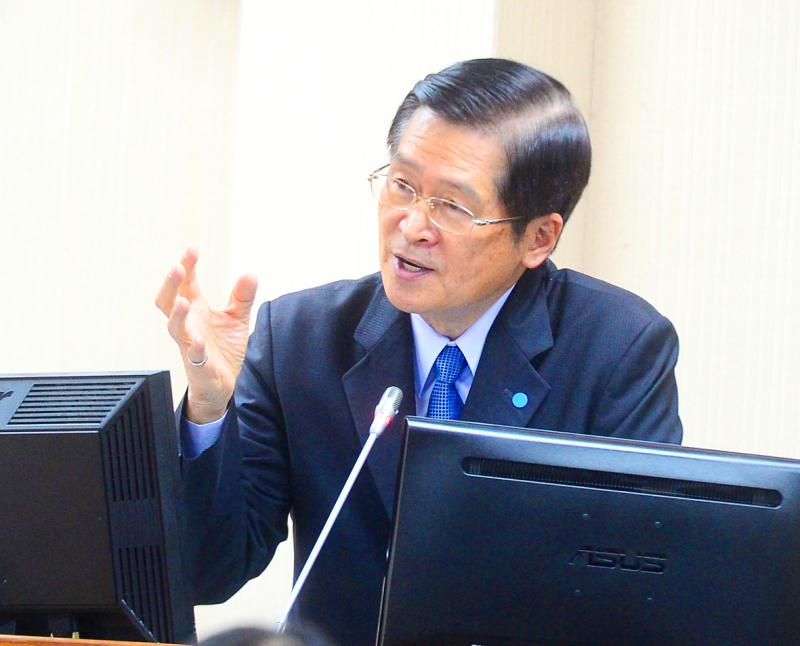The Ministry of National Defense yesterday announced the establishment of a defense mobilization agency to increase the combat preparedness of the nation’s reservists.
President Tsai Ing-wen (蔡英文) in June had said that the nation’s reservists would play a more important role in national defense.
Minister of National Defense Yen De-fa (嚴德發) told lawmakers that there had been 1,710 and 1,029 incidences of Chinese planes and ships respectively having crossed into the nation’s air defense identification zone so far this year.

Photo: Wang Yi-sung, Taipei Times
Chinese planes had crossed the median line of the Taiwan Strait 49 times so far this year, the highest number in 30 years, Yen said.
In view of the increased Chinese provocation, the ministry has proposed reforming the nation’s reservist forces in terms of administrative and unit-level organizations, training and equipment, Yen told lawmakers.
Administratively, all reservists would fall under a defense mobilization agency that would be established in January 2022 and is expected to cost NT$8.9 billion (US$307.3 million), he said.
The agency would outrank the current General Mobilization Office and would have 150 staff, up from 30, he added.
At the unit level, the Armed Forces Reserves centers in 18 cities and counties would answer to whichever combat area command centers they are closest to, Yen said.
In addition, reservist brigades would be expanded from seven to 12, further enhancing their combat strength, he said.
Reservists would be issued with the equipment used by standing forces and training would be enacted yearly instead of biennially, each exercise lasting for two weeks, Yen said, adding that the number of recalled reservists would be increased to 260,000 from 120,000.
General Mobilization Office Director Han Kang-ming (韓岡明) said that the daily wages for reservists being recalled for training would be increased by between 1.2 and 1.5 times.
The ministry would need to construct additional facilities due to the increased number of reservists who would be recalled for training, Yen said.
The nation has no plans to return to conscription, Yen said, adding that the volunteer service would produce older, but better-quality troops.
“We would adhere to a policy of having a minimal, highly trained standing force, with a greater number of reservists able to be mobilized,” he said.
The ministry expects the armed forces to be only 10 percent understrength by the end of this year, demonstrating that the military has not been affected by the COVID-19 pandemic, is unfazed by Chinese provocations and that there remains a willingness for young people to join the military, Yen said.

INVESTIGATION: The case is the latest instance of a DPP figure being implicated in an espionage network accused of allegedly leaking information to Chinese intelligence Democratic Progressive Party (DPP) member Ho Jen-chieh (何仁傑) was detained and held incommunicado yesterday on suspicion of spying for China during his tenure as assistant to then-minister of foreign affairs Joseph Wu (吳釗燮). The Taipei District Prosecutors’ Office said Ho was implicated during its investigation into alleged spying activities by former Presidential Office consultant Wu Shang-yu (吳尚雨). Prosecutors said there is reason to believe Ho breached the National Security Act (國家安全法) by leaking classified Ministry of Foreign Affairs information to Chinese intelligence. Following interrogation, prosecutors petitioned the Taipei District Court to detain Ho, citing concerns over potential collusion or tampering of evidence. The

‘FORM OF PROTEST’: The German Institute Taipei said it was ‘shocked’ to see Nazi symbolism used in connection with political aims as it condemned the incident Sung Chien-liang (宋建樑), who led efforts to recall Democratic Progressive Party (DPP) Legislator Lee Kun-cheng (李坤城), was released on bail of NT$80,000 yesterday amid an outcry over a Nazi armband he wore to questioning the night before. Sung arrived at the New Taipei City District Prosecutors’ Office for questioning in a recall petition forgery case on Tuesday night wearing a red armband bearing a swastika, carrying a copy of Adolf Hitler’s Mein Kampf and giving a Nazi salute. Sung left the building at 1:15am without the armband and apparently covering the book with a coat. This is a serious international scandal and Chinese

Seventy percent of middle and elementary schools now conduct English classes entirely in English, the Ministry of Education said, as it encourages schools nationwide to adopt this practice Minister of Education (MOE) Cheng Ying-yao (鄭英耀) is scheduled to present a report on the government’s bilingual education policy to the Legislative Yuan’s Education and Culture Committee today. The report would outline strategies aimed at expanding access to education, reducing regional disparities and improving talent cultivation. Implementation of bilingual education policies has varied across local governments, occasionally drawing public criticism. For example, some schools have required teachers of non-English subjects to pass English proficiency

TRADE: The premier pledged safeguards on ‘Made in Taiwan’ labeling, anti-dumping measures and stricter export controls to strengthen its position in trade talks Products labeled “made in Taiwan” must be genuinely made in Taiwan, Premier Cho Jung-tai (卓榮泰) said yesterday, vowing to enforce strict safeguards against “origin laundering” and initiate anti-dumping investigations to prevent China dumping its products in Taiwan. Cho made the remarks in a discussion session with representatives from industries in Kaohsiung. In response to the US government’s recent announcement of “reciprocal” tariffs on its trading partners, President William Lai (賴清德) and Cho last week began a series of consultations with industry leaders nationwide to gather feedback and address concerns. Taiwanese and US officials held a videoconference on Friday evening to discuss the